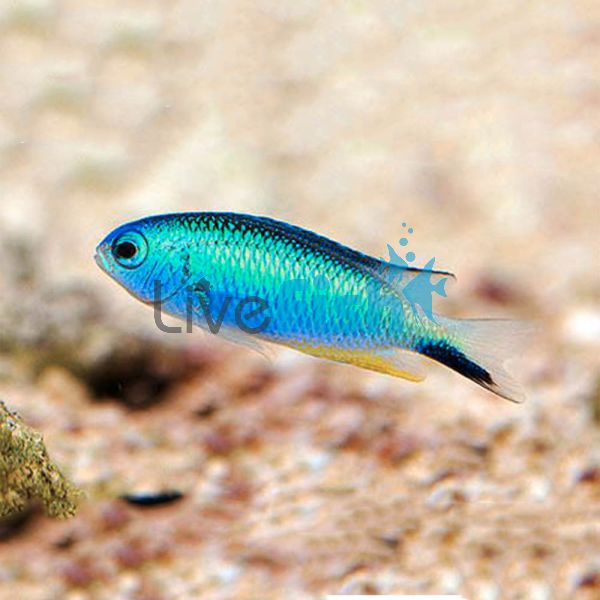Allens Damselfish - Medium
This is a visually striking fish which is neon blue with a mixing of yellow near the bottom of the body down into the anal fin. You can keep many these easy to care for, bright active fish together in your aquarium.
- Buy 4 for $35.24 each and save 10%
Allen’s Damselfish
Allen’s Damselfish like many damselfish they are very attractive with their shiny blue and green colour nuances.
Allen’s Damselfish are semi-aggressive but are less aggressive than many others in this family. They do become more aggressive as they get older or when they are pairing or laying eggs.
They are an ideal fish for beginners as they are quite hardy and don’t have any tricky dietary needs.
In the wild, they are often seen in shoals and in the aquarium you can keep either a single specimen, a known male-female pair, or a large-sized odd-numbered shoal (9 or more). They should be introduced at the same time as juveniles into a large tank.
These fish form distinct pairs when breeding and will lay up to 1000 eggs. These are deposited either in caves or directly onto the substrate and then guarded and aerated by the male until hatching.
When these fish feel threatened they will change colour and become pale or brownish.
In the wild, these fish are usually found inshore areas and outer reef slopes, usually staying close to the corals living amongst the mixed rubble substrate.
Tank Recommendations for Allens Damselfish
This Damselfish is semi-aggressive a minimum of a 76 litre (20 gallons) aquarium for a single fish. If you are planning on keeping more of these Damselfish together then you should add an extra 36 litres of water per Damselfish.
These small fish need rock-work with caves and crevices for a hiding place. Live rock ideal for this with algae growing on it as the Damselfish will include t his in its diet.
It will not harm invertebrates or disturb the tank setting as this is a small fish.
Suitable Tank Buddies
This species of Damselfish thrives best if it is kept in a group of nine or more individuals. Avoid keeping it with any really docile species such as Firefish and Cardinalfish
Usually Compatible
These Damselfish are less aggressive than many other types of Damselfish and so keeping them with more peaceful or semi-aggressive fish is recommended. Angelfish, Dragonets, Tangs and Wrasses and invertebrates and shrimps all usually make good tank mates for these fish.
Sometime Compatible
Be cautious and monitor these fish if you keep them with Angler or Frogfish. If you are keeping Allen’s Damselfish with other Damsels ensure that the tank is big enough with plenty of hiding spaces for them to hide away from other more aggressive fish.
Rarely Compatible
These damselfish are only small and so predatory fish like Lionfish, Groupers, Eels and Rays will eat them. They will be too aggressive to keep with Seahorses or Pipefish too.
Feeding Your Allens Damselfish
Allen’s Damselfish are omnivorous and feed on phytoplankton and zooplankton in their natural habitat. In the home aquarium, they are not picky and will accept a varied diet.
You can feed them live foods like mysis and brine shrimp, frozen, freeze-dried flakes and pellets as well as chopped shrimp, clams and fish.
They will also eat algae and will protect algae growing in their territory in the tank on live rock, which explains their aggression towards other fish and invertebrates, that want to eat their algae.
It’s best to feed these fish 3 times a day to help reduce their need to protect their algae gardens.
| Scientific Name | Pomacentrus Alleni |
|---|---|
| Care Level | Easy |
| Common Names | Neon Damselfish, Allen's Damselfish and the Allen's Pomacentrus, Andaman damsel, Blue Star Damselfish |
| Diet | Omnivore |
| Fish Family | Pomacentridae |
| Lifespan (years) | 15 |
| Max. Length (cm) | 6.5 |
| Min. Tank Volume (l) | 76 |
| Origin | Indonesia, Sri Lanka |
| Reef Safe | Yes |
| Sociability | Semi-aggressive |
| Venomous | No |
| Water Conditions | 22.2-25.6° C, dKH 8-12, pH 8.1-8.4, sg 1.020-1.025 |




